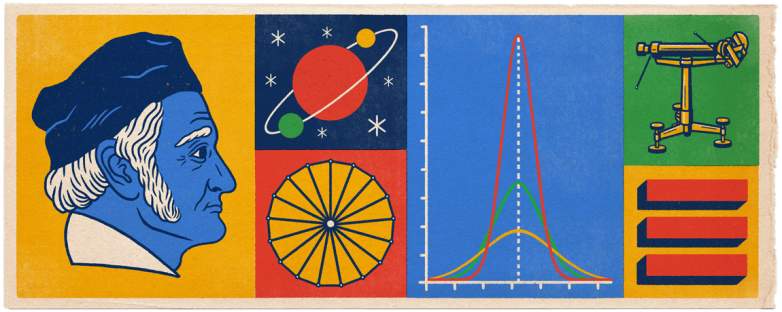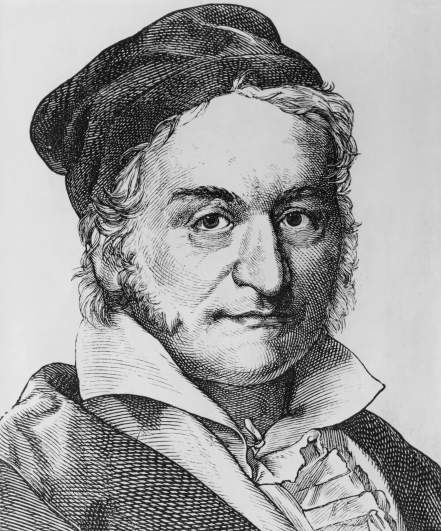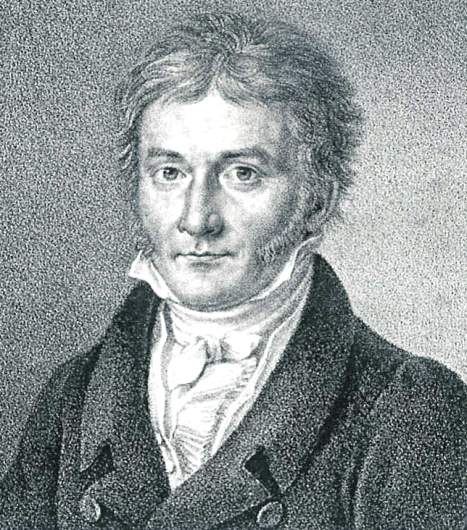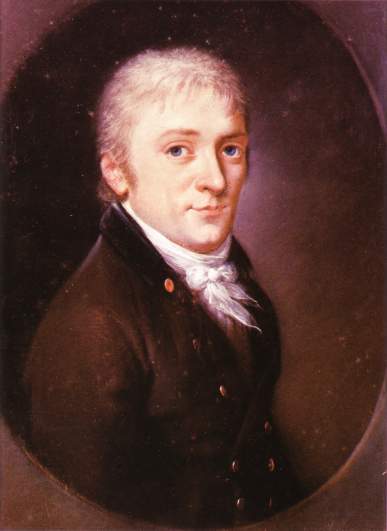
GoogleJohann Carl Friedrich Gauss is being celebrated with a Google Doodle.
Johann Carl Friedrich Gauß is being celebrated with a Google Doodle on what would have been his 241st birthday.
The German mathematician, also known as Johann Carl Friedrich Gauss and Carl Friedrich Gauss, made significant contributions to several fields, including number theory, algebra, statistics, analysis, differential geometry, geodesy, geophysics, mechanics, electrostatics, magnetic fields, astronomy, matrix theory and optics. He has been called “the foremost of mathematicians” “and the greatest mathematician since antiquity.”
Here’s what you need to know about Johann Carl Friedrich Gauß:
1. Gauss Was Born to Poor, Working-Class Parents & Was a Child Prodigy Who Figured Out His Own Date of Birth, Because His Mother Never Recorded It

GettyGerman mathematician and scientist Carl Friedrich Gauss.
Johann Carl Friedrich Gauss was born in 1777 to poor, working class parents in Brunswick in the Duchy of Duchy of Brunswick-Wolfenbüttel, in what is now part of Lower Saxony, Germany. Gauss’ mother was illiterate and did not record his actual date of birth, but he later solved the puzzle of when he was born himself, and determined it was April 30, Bruce Director wrote in The American Almanac in an article titled, “Mind Over Mathematics: How Gauss Determined The Date of His Birth.”
Director wrote, “Gauss’s mother could not remember the date of her first son’s birth. All that she could remember, was that it was a Wednesday, eight days before Ascension Day, which occurs 40 days after Easter Sunday. This was not necessarily an unusual circumstance in those days, as most parents were preoccupied with keeping their infant children alive. Once the struggle for life was secured, the actual date of birth might have gone unrecorded. Twenty-two years later, the mother’s lapse of memory provoked the son to employ the principles of higher arithmetic, to measure astronomical phenomena, with a discovery grounded in the principle that the cognitive powers of the human mind are congruent with the ordering principles of the physical universe. In 1799, Gauss determined the exact date of his birth to be April 30, 1777, by developing a method for calculating the date of Easter Sunday, for any year, past, present or future.” You can read more about that method here.
Gauss was a child prodigy, according to Britannica. “. The encyclopedia explains, “he was rare among mathematicians in that he was a calculating prodigy, and he retained the ability to do elaborate calculations in his head most of his life.” He also had a gift for languages.
His grandson, Charles Henry Gauss, wrote in a letter to a Colorado College professor in 1898, “Had Grandfather given his life to the study of Languages he doubtless would have made a name for himself. … I believe it is somewhat unusual for a person of great ability in one direction to have more than ordinary ability in other ways. Grandfather was a notable exception to this. In early life he debated whether to study Philology or Mathematics and he is known for his discoveries in natural science, including electricity and astronomy almost as well as for his solution of problems in pure mathematics. It may not be so well known that he also had decided ability in Finance. he kept all of his business accounts with the most scrupulous exactness, and altho born in poverty he was able to accumulate quite a fortune for one in his position. My Father said that Grandfather would have made a most successful Minister of Finance had he been called to such a place by his Government.”
2. His Mathematical Skills Attracted the Attention of the Duke of Brunswick, Who Helped Him Attend the Collegium Carolinum & the University of Göttingen, Where He Made His First Discoveries
When Gauss was young, his mathematical skills and ability as a student attracted the attention of Charles William Ferdinand, the Duke of Brunswick-Wolfenbüttel, who funded his education, according to the University of St. Andrews. He began studying at the Brunswick Collegium Carolinum in 1792, where he discovered, the “Bode’s law, the binomial theorem and the arithmetic- geometric mean, as well as the law of quadratic reciprocity and the prime number theorem,” according to his biography on the St. Andrew’s website.
Gauss then moved on to Gottingen University in 1795. He completed his degree in 1799. According to Britannica, his first two major publications came in the early 1800s:
Gauss’s recognition as a truly remarkable talent, though, resulted from two major publications in 1801. Foremost was his publication of the first systematic textbook on algebraic number theory, Disquisitiones Arithmeticae. This book begins with the first account of modular arithmetic, gives a thorough account of the solutions of quadratic polynomials in two variables in integers, and ends with the theory of factorization mentioned above. This choice of topics and its natural generalizations set the agenda in number theory for much of the 19th century, and Gauss’s continuing interest in the subject spurred much research, especially in German universities.
The second publication was his rediscovery of the asteroid Ceres. Its original discovery, by the Italian astronomer Giuseppe Piazzi in 1800, had caused a sensation, but it vanished behind the Sun before enough observations could be taken to calculate its orbit with sufficient accuracy to know where it would reappear. Many astronomers competed for the honour of finding it again, but Gauss won. His success rested on a novel method for dealing with errors in observations, today called the method of least squares. Thereafter Gauss worked for many years as an astronomer and published a major work on the computation of orbits—the numerical side of such work was much less onerous for him than for most people. As an intensely loyal subject of the duke of Brunswick and, after 1807 when he returned to Göttingen as an astronomer, of the duke of Hanover, Gauss felt that the work was socially valuable.
According to Britannica, Gauss also surveyed the territory of Hanover, invented “the heliotrope (an instrument that reflects the Sun’s rays in a focused beam that can be observed from several miles away,” published works on number theory, the mathematical theory of map construction, and many other subjects. In the 1830s he became interested in terrestrial magnetism and participated in the first worldwide survey of the Earth’s magnetic field (to measure it, he invented the magnetometer). With his Göttingen colleague, the physicist Wilhelm Weber, he made the first electric telegraph.”
3.Gauss Was a Perfectionist & Did Not Publish Many of His Discoveries Because He Did Not Think They Were Complete & Above Criticism
Gauss was known to be a perfectionist and a hard worker, according to Musings on Math.
“If there is to be one major criticism of Gauss, it is with his reluctance to publish his discoveries. Gauss, ever the perfectionist, did not like to publish many of the results of his research, fearing that they were never perfect enough. Or, as Gauss would describe it later in life, “pauca sed matura” (few, but ripe),” Musings on Maths writes. “In fact, most of what Gauss discovered was not known until after his death when colleagues went through his mathematical diary. Looking at this as a major travesty to mathematics, it is the opinion of the famous mathematician, historian and mathematical romantic E.T. Bell that Gauss’ reluctance to publish his discoveries set mathematics back at least 50 years.”
According to FamousScientists.org, “He kept a diary of his discoveries, beginning with the heptadecagon. The diary, listing 146 discoveries, was lost for over 40 years after his death.”
4. He Was Married Twice & Had 5 Children, Who He Did Want to Follow His Footsteps Into Mathematics Because He Did Not Want to Risk Having His Name Weakened

Johann Carl Friedrich Gauss.
Gauss was married twice. He married Johanna Osthoff on October 9, 1805, and had a son and daughter with her. His first wife died in 1809 and their son, Louis, died a year later. Gauss remarried, to Minna Waldeck, in 1810, and they had three children together. They were married until her death in 1831.
Gauss “was shattered” by his first wife’s death and that overshadowed his personal life, according to a biography written by the University of St. Andrews. His second wife was his first wife’s best friend, and the biography explains that the marriage seemed to be one of “convenience” for Gauss. While his personal life suffered, his “work never seemed to suffer from his personal tragedy.”
According to the Complete Dictionary of Scientific Biography, “In marked contrast to this external simplicity, Gauss’s personal life was complicated and tragic. He suffered from the political turmoil and financial insecurity associated with the French Revolution, the Napoleonic period, and the democratic revolutions in Germany. He found no mathematical collaborators and worked alone most of his life. An unsympathetic father, the early death of his first wife, the poor health of his second wife, and unsatisfactory relations with his sons denied him a family sanctuary until late in life.”
He had a tenuous relationship with his children, according to a letter written by his grandson, Charles Henry Gauss. He did not want his children to follow him into mathematics or other sciences because he feared they would not match his accomplishments and would weaken his name.
“What I have written will have little interest for the ordinary reader but you possibly may be interested in what I have said of my Father in so far as it gives a glimpse of the mind and temperament of Grandfather. He – that is Grandfather – did not want any of his sons to attempt mathematics for he said he did not think any of them would surpass him and he did not want the name lowered. Probably he felt the same in a measure of any other line of scientific study,” his grandson wrote in the letter.
Charles Henry Gauss’ father, Eugene, moved to America and became a businessman. Eugene’s brother, Wilhelm, also became a businessman in America, while their sister, Therese, lived with the elder Gauss until his death, caring for him.
5. Gauss Died of a Heart Attack in 1855 & His Brain Was Preserved to Be Studied

Carl Friedrich Gauss.
Gauss died of a heart attack on February 23, 1855, in Gottigen in the Kingdom of Hanover. He was 77. According to his obituary, Gauss died after a “protracted and painful illness, which for more than a year had exhausted his physical energies.” His death notice added his illness, “could not impair the vigor and clearness of his wondrous intellect.” The obituary noted he was called “the father of sciences.”
He was eulogized by hi son-in-law Heinrich Ewald and his close friend and biographer Wolfgang Sartorius von Waltershausen. Gauss is buried in Albanifriedhof, a graveyard in Gottigen.
Gauss’ brain was preserved after his death to be studied, but at some point it was accidentally switched with another German scientist, physician Conrad Heinrich Fuchs, who also died in Gottigen in 1855, according to the Max Planck Institute for Biophysical Chemistry. His brain was recently studied again in 2013.
“The new MRI results also demonstrate that earlier publications on the alleged Gauss brain did not provide false information. There, the mathematician’s brain was described as normal. Walter Schulz-Schaeffer, head of the Prion and Dementia Research Unit of the Institute of Neuropathology at the University Medical Center Göttingen, inspected the recent images. He confirms that the brain of the brilliant mathematician and astronomer Gauss, like that of the physician Fuchs, is largely anatomically inconspicuous. The two brains are also similar in size and weight,” the Max Planck Institute for Biophysical Chemistry wrote.
“The age-related changes in Gauss’ brain are normal for a 78-year old man. Changes in the basal ganglia could be indicative of high blood pressure,” Schulz-Schaeffer said.
